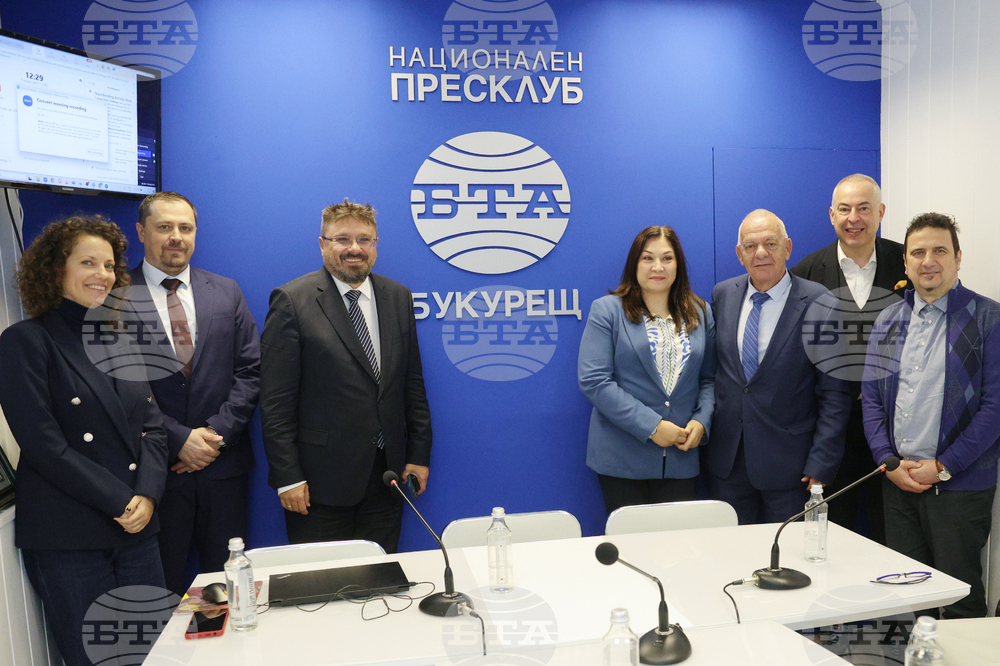site.btaBTA's Europe on Balkans Cohesion Skills Conference Held in Bucharest


Representatives of various sectors who have worked on projects related to the EU's Cohesion Policy participated in a cross-border conference at the National Press Club of the Bulgarian News Agency (BTA) in Bucharest on Tuesday. The event was part of BTA's Europe on Balkans: Cohesion Skills project.
Bulgaria and Romania have been together in Europe for centuries before the European Union (EU), but their EU membership removed all borders between them, said Bulgarian News Agency (BTA) Director General Kiril Valchev. "Even before the borders between Bulgaria and Romania were abolished with the entry into Schengen, the national news agencies of Bulgaria and Romania - BTA and Agerpres, respectively - set an example by abolishing the barriers to today's knowledge in both countries, as the common past requires us to know our present better and because sometimes we look like distant relatives," he emphasized.
Agerpres Director General Claudia Nicolae stressed that the role of a journalist is to preserve history and pass on the reality to future generations. She said Bulgaria and Romania gradually began to understand that cultural and regional peculiarities will lead to other collaborations and common interests, as was the case with BTA and Agerpress. She noted that the two news agencies work for common interests and promote objective information. "Beyond the areas of interest that we are talking about today - research, education, cohesion, which actually tell us about our belonging to the EU and joining European policies - I think journalism is the main link that can, on the one hand, promote and encourage all these developments, and on the other hand, defend reliable information," Nicolae stated.
Bulgarian Ambassador to Romania Radko Vlaykov said that knowledge about the importance of the EU is essential for society. "The meaning of such projects, such as that of BTA, as well as the meaning of cooperation with agencies such as Agerpres, is to resist the enormous power of the hybrid wars that are being waged against us, which aim to provoke Euroscepticism," Vlaykov stressed, adding that fake news and manipulations can be answered with only one thing, the truth. He pointed out that this is where the huge role of the media and cooperation in the field of education and science between the two countries lies.
Today's event refutes the cliché that Bulgarians and Romanians don't know each other and can't work together, said the host of the weekly programme Panorama on the Bulgarian National Television Boyko Vassilev. "[This cliche is] Namely that we, Bulgarians and Romanians, have a hard time working together, that we don't know each other and that we don't use Europe's resources to do our own things", he stressed, adding that he knows how this cliché was born. "Romania and Bulgaria were always together in tandem for the accession of both, NATO and the EU. After that they remained the two neighbouring countries that knew each other the least. I always wondered why", he emphasized. Vassilev pointed out that even during communism the two countries knew a lot about themselves - in the literal sense of the word, as Bulgarians followed Romanian literature and art, and even knew Romanian TV series, while many Romanians also watched the Bulgarian National Television.
More than 15,000 students are studying at Ovidius University in Constanta, which makes it the largest higher education institution in the EU on the Black Sea, said Prof. Igor Sirodoev. He noted that the university benefits from the advantages of international cooperation, but also faces challenges, such as the development of intercultural competences among students, the harmonization of the education systems between Bulgaria and Romania, as well as the mutual recognition of diplomas. Sirodoev pointed out that the Ovidius University cooperates with higher education institutions from Bulgaria under the Erasmus+ programme. Among the partner universities are the Trakia University in Stara Zagora, Shumen University, as well as the Technical University in Varna.
Craiova University professor Mihaela Udristioiu said that the Chance for Development project provided students with career opportunities in the cross-border region between Bulgaria and Romania. Udristioiu, who has Bulgarian roots, pointed out that there are many bridges between the two countries, as well as a common genetic heritage. She presented the Chance for Development project, which was implemented during the programming period 2017-2019 by Craiova University, Svishtov University and the Vidin branch of the Ruse University. The aim of the project was to increase the participation of students in the region and their professional development and employment. The project was worth EUR 650,000 and included 600 university students.
After the conference, some of the participants had a tour of the Bulgarian landmarks in the historical center of Bucharest. Their guide was Lyubomir Nikolov, deputy leader of the Democratic Union of Bulgarians in Romania. The tour began at Hanul cu Tei (The Linden Tree Inn), the only historical inn in the Romanian capital that has preserved its authentic appearance, went through Gabroveni Inn and the Manuc Inn, and finished in the courtyard of the Church of St. Anton.
BTA's Europe on Balkans: Cohesion Skills project aims to raise public awareness and foster open dialogue about cohesion policy, local achievements, and the implementation of the EU's policy priorities. The project kicked off with a conference in Veliki Preslav in November 2024. The schedule of conferences until the end of September 2025 includes events in the following cities: Blagoevgrad, Burgas, Varna, Veliko Tarnovo, Vidin, Vratsa, Gabrovo, Dobrich, Kazanlak, Kardzhali, Kyustendil, Lovech, Montana, Pazardzhik, Pernik, Pleven, Razgrad, Ruse, Samokov, Svishtov, Sliven, Smolyan, Sofia, Stara Zagora, Troyan, Targovishte, Haskovo, Shumen, and Yambol. Cross-border conferences will be held in Belgrade, Bosilegrad, Bucharest, Edirne, Skopje, and Thessaloniki. The project builds on the Europe in the Balkans: A Common Future and Europe in Bulgaria: A Common Future projects, implemented by BTA in 2023 and 2024, respectively.
/NF/
Additional
news.modal.image.header
news.modal.image.text
news.modal.download.header
news.modal.download.text
news.modal.header
news.modal.text
































